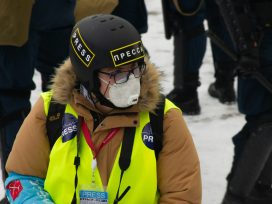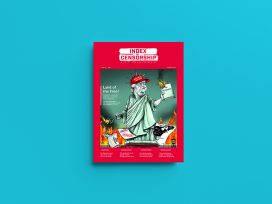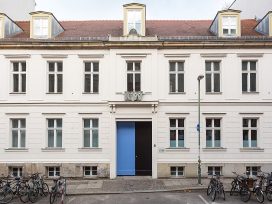As communist systems fell in 1989, so ideological newspeak, censored reports, and tailor-made television footage departed the media landscape. Established and apparently unassailable systems of state funding and subsidy also disappeared, along with other more benign aspects of information distribution in the former Soviet satellite states. Gone were the hints of subtext subtly introduced between stilted formulations affirming loyalty to the Party and the USSR; the humorous scepticism with which news reports were unanimously greeted; and the companionable late night huddles around the radio to pick up the BBC World Service or Radio Free Europe.
In Poland, media were deregulated with a view to diversifying and, as far as possible, liberating the market. The idea was to minimize “policy” and focus on breaking up the communist state’s hold on broadcasting and the press to create a foundation for free, pluralist, democratic and commercialized media. Initially, no measures were taken to restrict concentration of ownership, or to guarantee subsidies for local or smaller press publications. New owners from abroad with plenty of capital were warmly welcomed, but the entrenched attitudes of politicians and economic elites proved hard to shake off. Since 1989, successive ruling elites have been reluctant to accept public criticism, preferring to assume that the media should remain a tool of governance and that journalism is necessarily politically partisan. Today the pressures imposed on journalists by politicians, owners and publishers remain largely uncontrolled, and exerted through loopholes in media regulation, the removal of awkward executives and editors, the withdrawal of funds and the appointment of loyal managers or journalists. Neither editorial independence nor the relationship between government and the media is defined by anything more detailed than a general constitutional guarantee of press freedom prohibiting censorship. In addition, journalists are still bound by a press law that obliges them to comply with whatever declared principles are upheld by their publishers. Any violation of this provision can be sufficient grounds for dismissal.
The early 1990s brought an average of 100 new titles a month onto the Polish press market along with choices of style, specialization, quality and gloss. By 2006, over 5400 press publications were on offer including 167 dailies, 827 weeklies and 2,402 monthlies. The potential size of the Polish press market, and a lack of available domestic capital for media investment, attracted publishers from western Europe, predominantly Germany, who offered investment, modernization and training, and carried enough international prestige effectively to withstand local political interference. They included now dominant companies such as H Bauer, which has invested in more than 30 Polish magazines; Verlagsgruppe Passau (Polskapresse) and the Norwegian company Orkla Press (Presspublica) – both with a serious stake in the regional press; and Axel Springer, owner of the best selling national dailies Fakt and Dziennik and 18 magazines in Poland. The only major domestic challenge to these concerns has come from Agora SA, owner of the leading daily Gazeta Wyborcza.
Development and marketing strategies have varied: Bauer, Springer and Passau have expanded exclusively in the press sector. Agora, along with other domestic players in the audiovisual market such as ITI Holdings and Holding FM, have developed through cross media ownership. The major owner in Polish television, Polsat, has looked to additional investments in banking, a pension fund and life insurance. With no restraints on media concentration, mergers and acquisition, links and shared strategies have also developed between different sectors of the industry. These, critics say, have seriously affected performance in the media market. Costs, services and service providers are shared by major players such as Orkla and Polskapresse, or ITI and Holding FM. Content is recycled, duplicated and transmitted to save on journalistic production. As purchasing power has dropped, dailies have consolidated and lost readers, content has become less original and competitiveness has declined. In the face of economic and political pressures, serious journalism and investigative reporting have been put aside to make room for lightweight material, advertising and infotainment. In many ways, pluralism has failed to guarantee either media independence or diversity, and has not offered any clear notion of what a pluralistic public sphere should be.
Adam Michnik, the editor of Poland’s most successful daily, Gazeta Wyborcza, has spoken of the media as the place “where people communicate with each other, where the language of public debate and [] values are formed”. Most West Europeans would probably find it hard to disagree, though they might balk at the way Polish media apparently aspire to something the international broadcasting expert Karol Jakubowicz has called a “national consensus on the shape of the new social order”. The “consensus” seems to centre on the idea of a universal, integrated public sphere dominated by the idea of national rather than individual rights, with media content that is mostly uniform, discursively homogeneous and often ethnically biased.
In 2006, Axel Springer’s Newsweek Polska published an article by its chief editor Tomasz Wroblewski commenting on an idea introduced by Poland’s public television authority KRRiT that journalists should work in partnership with politicians. Rather than probing and exploring matters of public interest in interviews with politicians, they should engage them in a “quiet chat” and leave it to the politicians to “guide” them in the interpretation of their story. Under this façade of democratic journalism, Wroblewski commented, “both free speech and integrity are trampled”.
A market that was meant to bring pluralism has also, in some ways, set a constricting frame for debate and opinion forming. It has encouraged the media to attract an audience by offering reassuringly familiar fables or stereotypes, and avoiding material that is troubling, thought-provoking, morally complex or representative of the views and perspectives of social minorities. For all the rhetoric on inclusiveness and the need for a greater accommodation of cultural difference, the under-representation of ethnic, religious, sexual or physically-challenged minority groups in mainstream media and in the industry’s decision-making processes remains a serious issue. The depiction of identity remains overwhelmingly one-dimensional: Polish or non-Polish. Any notion of a negotiated identity or the possibility of embracing different cultures without dissonance remains unaddressed. Minority presses are given grants by the Ministry of Culture – more than 50 press publications of ethnic and religious minorities were registered in the mid-1990s – but in mainstream media, outsiders generally serve to legitimate and affirm a “universalist” vision. The image of a Roma criminal highlights the moral supremacy of the majority; a Slovak portrayed in terms that suggest weakness or helplessness testifies to Polish vigour; a barefoot Ruthenian peasant living in a quaint though bare wooden cottage is a reassuring sight if you happen to be an urban Pole with a western car; and a “captured” asylum seeker is evidence of the alertness of the border authorities.
As journalism relegates Poland’s Belarusian, Ukrainian, Lithuanian or Tatar communities to folklore, or excludes them from representation altogether, so any hope of equal interaction between the majority and other, smaller groups grows dim. Although the Broadcasting Act of 1992 provides that public broadcasting should take into consideration the needs of minorities and ethnic groups, it fails to detail concrete media access, airtime or funding. It also specifies that public broadcasting should “respect the Christian system of values, considering as its basis the universal principles of ethics”. As Beata Klimkiewicz remarks in her “International Development Studies Network Report on Ethnic Minorities and Media in Poland”, there remains a marked lack of multi-perspective journalism “to counter the prevailing understanding that there is only one version of what constitutes truth or reality and only one way to talk about it”.
When the November 2005 election returned a rightwing government that subsequently entered into a coalition with two extremist parties, the media supporting the new leadership were given a spectacular boost. A Catholic media empire controlled by a Redemptorist priest, Tadeusz Rydzyk, became so influential among conservative voters that his support seemed indispensable to every rightwing party. The signing of the coalition agreement in February 2006 was covered exclusively by Rydzyk’s ultra-conservative television station Trwam, sparking outrage among more liberal journalists. Rydzyk also runs a school of journalism in Torun, the nationalist daily Nasz Dziennik and the controversial Catholic radio station Radio Maryja. This ranks third in Polish radio after the dazzlingly successful music and news stations Radio RMF and Radio Zet. Radio Maryja is reported to have about 1 million listeners and functions as a “social broadcaster” exempt from a commercial licence fee on the grounds that its programming is educational, Christian and strives to preserve and protect Polish national identity. In March 2006, Radio Maryja gained international notoriety for its xenophobic posturing and in particular for a broadcast by the lawyer Stanislaw Michalkiewicz alleging that Jewish groups were profiteering from the Holocaust. The remarks prompted a response from the last surviving leader of the 1943 Warsaw Ghetto uprising, Marek Edelman, who warned in an open letter to Gazeta Wyborcza that persecution can begin with words which may lead seamlessly to deeds.
The “universalist” perception – caught up in memories of successive historical dismemberments of the Polish state and of enemies within and without – has been effectively countered by the popular liberal daily Gazeta Wyborcza. Its editor, Michnik, is an historian and a former political prisoner who has had to tread a fine line between his liberal leanings and the pragmatic necessity to absorb, as much as resist, the pressures of Polish patriotism. While acknowledging that absolute ideas encourage valuable attributes such as loyalty and compassion, Michnik has warned of the dangers of inflexible postures: “Moral absolutism is a great strength of people and communities engaged in a battle with dictatorships. In a world of democratic procedures built upon the rubble of totalitarianism it is a weakness. There is no room here for utopian visions of justice and harmony or for the ethical rigour characteristic of people functioning in resistance to totalitarian orders. Both are an anachronism and a delusion. Both offend democracy.”
Michnik’s views and his success as a journalist, intellectual and media magnate, have enraged sectors of the Right. He has been accused of surrounding himself with a retinue of devotees as blindly loyal as the followers of Fr Rydzyk. Yet Gazeta and its owner, the joint stock company Agora SA, have remained a unique phenomenon on the Polish media market. Since its foundation in 1989 at the time of the partially free election that brought to parliament many candidates from the Solidarity Trade Union movement, Gazeta has become a runaway success. Published as a national in tabloid format with a high proportion of serious content, 19 regional supplements and several weekly magazines, it has established itself as a hugely influential opinion-forming presence. Despite challenges from other less highbrow dailies, in particular Axel Springer’s tabloid Fakt, modelled on the company’s flagship title Bild Zeitung, which sold in record numbers when it appeared in 2003, Gazeta has fought hard to maintain a dominant position nationally and regionally. Its average monthly sales in October 2008 approached 422 000 copies, compared to Fakt‘s sales of over 477 000. But in November, figures from the Polish Reader’s Survey showed that Gazeta was being read by 17 per cent of respondents compared to Fakt‘s 16 per cent. A tabloid entitled Super Express, owned by the Swedish company AB Marienberg International and the Polish company Holding ZPR, came third in the charts with sales coming up to 198,000, followed by Springer’s Dziennik (157 000), and Presspublica’s analytical, economically oriented daily Rzeczpospolita (156 000).
Agora also owns three regional weeklies; 14 national colour magazines; the Metro daily; a network of 29 local radio stations; the Internet portal gazeta.pl; a successful announcement website Aaaby.pl; and has shares in the Art Marketing Syndicate (AMS) advertising company. Over the years, Agora has gained from the absence of any legal provision to limit financial and ownership links among different media sectors, and a similar absence of controls on concentration across different sectors of the media supply chain. Moreover, in 2002, there was talk of the company’s interest in moving into television and buying shares in Poland’s most successful private TV company Polsat.
At the time, largely to comply with EU audiovisual policy requirements, an amendment to the 1992 Broadcasting Act was being prepared with a view to introducing anti-concentration laws and greater transparency in media ownership. Had the amendment been passed, the publisher of a national daily would have been disqualified from holding a licence for a national radio or television channel. But it was not – largely thanks to the repercussions following allegations that members of the governing elite had attempted to solicit a massive bribe from Adam Michnik to introduce changes into the Broadcasting Act that would benefit Agora and allow it to buy up Polsat.
The allegations centred on secret tape recordings made in Michnik’s office in July 2002 that revealed the film producer Lew Rywin, internationally known for his work on Schindler’s List and The Pianist, had tried to persuade Michnik to offer US$17.4 million to the ruling SLD (Democratic Left) Party in exchange for the said changes to the broadcasting law amendment. Rywin indicated that he was representing a group of public figures including Prime Minister Leszek Miller and the head of Polish Public Television, Robert Kwiatkowski.
Gazeta hung onto the recording for five months to explore the full story and finally blew the whistle in December 2002. Parliament ordered an immediate investigation that disclosed serious irregularities in legislative procedures and led to criticism of the amendment and its withdrawal from parliament. In March 2004, a new, simpler amendment was passed to comply with the EU’s AVMS Directive; ironically, this held no anti-concentration clauses. In April, Lew Rywin was sentenced to two years imprisonment for fraud and a month later Prime Minister Leszek Miller resigned. Just who, if anyone, was behind Rywin’s visit to Michnik remains a mystery. The court that sentenced Rywin concluded that he had been acting on his own initiative, but the Prime Minister, along with head of public service television (TVP) Robert Kwiatkowski and Wlodzimierz Czarnasty of the National Radio and TV Broadcasting Council (KRRiT) were nevertheless named in parliament as the men behind Rywin’s proposal. A few months on, a court of appeal concluded that Rywin had been acting on behalf of a still unidentified group.
In the course of all this, Jerzy Urban, editor of the controversial satirical weekly Nie, observed caustically that he, for one, was inclined to look very favourably on signs of corruption in the system. “The disappearance of the bribe would turn the political elite against the economic elite. Their interests would conflict. It would be war. Corruption, on the other hand, ensures harmony and cooperation between these two sectors of the ruling class.” In a society where politics and business are still finding ways of working together, where political identities often prevail over professional identities and where the tradition of partisan and opinionated journalism is strong, political interest in the media carries a decisive impact. As the most popular medium with the furthest outreach, television is particularly vulnerable, and parties in power since 1989 have consistently attempted to take control of public service broadcasting with a view to “reforming” it. But although management teams have changed, no effective reforms have yet been passed. Members of the KRRiT council, which controls broadcasting, are selected for their political allegiance and nominated by parliament, the senate and the President. In principle, KRRiT’s role is to safeguard freedom of speech, the right to information and public interest on radio and television. But it also supervises and regulates programming, allocates frequencies and licences, administers licence fees and apportions subscription revenues to public media. The council has additional monitoring powers in commercial broadcasting and can fine broadcasters or take away licences. KRRiT members have consistently been associated with politicians in power and, under the leadership of the Kaczynski twins’ Law and Justice Party (PiS), their number was reduced from nine to five. Since the election in October 2007, won by the more liberal party Civic Platform, there have been attempts to limit the KRRiT’s powers and change the way public TV management is appointed, but these have been vetoed by the staunchly conservative President Lech Kaczynski.
The public service broadcaster Televizja Polska (TVP) comprises the national channels TV1, TV2, regional TV3 (with 12 regional channels) and the satellite channel TV Polonia. The public service remit itself is largely unclarified, though the 1992 Broadcasting Act specifies that public service broadcasters should endeavour to strengthen family ties, support pro-health attitudes, contribute to combating “social pathologies” and respect the needs of ethnic minorities. TVP still holds around 50 per cent of a viewing audience that comprises over 97 per cent of households in the country. Public TV ratings fall substantially, however, during its – mostly late-night – “public mission” programmes, which have been the object of widespread criticism. In March 2008, the award-winning film director Agnieszka Holland spoke in an interview with Gazeta Wyborcza of the “painful” quality of TVP’s public service programming and the “one-sidedness” of its news reporting.
With 74 television channels and 235 radio stations available in Poland, there seems to be no shortage of choice. But competing private TV stations, dominated by the Polsat group and ITI, the owner of the TVN channels, focus almost exclusively on entertainment, movies and advertising. Their range of programming is far less diverse than sterner critics would like, though they have made visible inroads into public television’s ratings. In addition, up to 25 per cent of viewers also watch foreign TV channels, and a minority of 1 per cent tune into the Catholic stations Trwam and TV Puls.
Until 2004, foreign investors were allowed only minority shares – up to 33 per cent – in the audiovisual sector. As a result, non-Polish ownership in television and radio is proportionally far less visible than in the press sector. The extent of foreign investment in the press sector has touched deep-seated insecurities on occasion, and provoked even Michnik to ask whether “it is normal and healthy that all [print] media should be owned by foreign capital”. But fears and passions about old loyalties dating back to the People’s Republic of Poland can also run high. President Lech Kaczynski and his twin brother, the former Prime Minister Jaroslaw Kaczynski, are known for their nervousness about the old network of communist collaborators who once sucked the country dry and corrupted its institutions; they still regard Gazeta Wyborcza or ITI’s TV24 as part of a network of people linked to the communist security services that, they argue, pose a continuing threat to the country.
The President’s anxiety about journalists ready to challenge him or his twin brother reflects a continuing battle between the rightwing sector of Poland’s political class and its liberals. After a challenging interview with TVN’s reporter Monika Olejnik during the October 2008 EU summit in Brussels, President Kaczynski reportedly threatened, in a public tirade, to “deal” with her. “I am going to have you crushed”, he said. “You are on my short-list […] The special services […] won’t be able to defend you.” The undiplomatic outburst provoked outrage and condemnation from Reporters sans Frontières, and the President subsequently apologized.
Official sensitivities to defamation have been high in recent years. When considering invalidating an article of the criminal code providing up to a year in prison for libel in October 2006, the Constitutional Court declared that it recognized the importance of press freedom for democracy but that the individual’s dignity and reputation were more important. The following year, the OSCE’s representative on freedom of the media Miklos Haraszti reported that Poland had become the only nation in Europe to imprison journalists for defamation and called for it to be decriminalized.
It may be a reflection of the uncertainty or embarrassment with which this issue is viewed by the Polish authorities that none of the journalists concerned have had to serve their sentences. Andrzej Marek, from the regional weekly Wiesci Polickie was due to be jailed in June 2007 but received a presidential pardon. In July, Jacek Brzuszkiewicz of Gazeta Wyborcza received a six month suspended sentence and a fine of 1,300 euros for libelling a judge; and in December, two journalists from the weekly Gazeta Polska, Tomasz Sakiewicz and Katarzyna Hejke, had a defamation suit against them withdrawn. In a move that seemed to indicate signs of progress, on 19 September 2008, an article in the criminal code providing for prison sentences for anyone defaming the Polish nation was annulled. Ten days later, however, the Constitutional Court upheld a law threatening fines for the publication of articles not checked and approved by those quoted in them.
Clearly, in the Polish context, the media have a considerable way to go before real journalistic and editorial independence are in sight. In the months before the October 2007 election there were widespread reports that the phones of opposition reporters were being tapped. Professional associations and civil rights groups continue to call for broadcasting regulation authorities to shake off their political affiliations. And even though, since the election, the ruling Civic Platform Party has stressed the need for reform in the public service media, there has been little evidence yet of effective depoliticization or substantive change.






